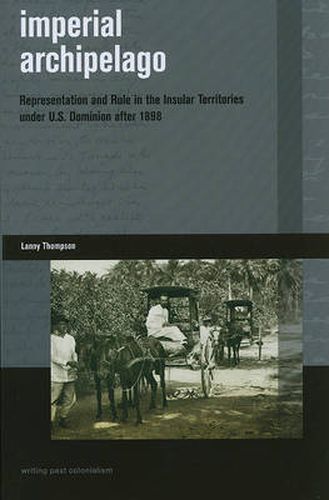Readings Newsletter
Become a Readings Member to make your shopping experience even easier.
Sign in or sign up for free!
You’re not far away from qualifying for FREE standard shipping within Australia
You’ve qualified for FREE standard shipping within Australia
The cart is loading…






‘Imperial Archipelago’ is a comparative study of the symbolic representations, both textual and photographic, of Cuba, Guam, Hawaii, the Philippines, and Puerto Rico that appeared in popular and official publications in the aftermath of the Spanish-American War of 1898. It examines the connections between these representations and the forms of rule established by the U.S. in each at the turn of the century-thus answering the question why different governments were set up in the five sites. Lanny Thompson critically engages and elaborates on the postcolonial thesis that symbolic representations are a means to conceive, mobilise, and justify colonial rule. Colonial discourses construe cultural differences among colonial subjects with the intent to rule them differently; in other words, representations are neither mere reflections of material interests nor inconsequential fantasies, rather they are fundamental to colonial practice. To demonstrate this, Thompson analyses, on the one hand, the differences among the representations of the islands in popular, illustrated books about the new possessions and the official reports produced by U.S. colonial administrators. On the other, he explicates the connections between these distinct representations and the governments actually established. A clear, comparative analysis is provided of the legal arguments that took place in the leading law journals of the day, the Congressional debates, the laws that established governments, and the decisions of the Supreme Court that validated these laws. Interweaving postcolonial studies, sociology, U.S. history, cultural studies, and critical legal theory, ‘Imperial Archipelago’ offers a fresh, transdisciplinary perspective that will be welcomed especially by scholars and students of U.S. imperialism and its efforts to extend democracy overseas, both past and present.
$9.00 standard shipping within Australia
FREE standard shipping within Australia for orders over $100.00
Express & International shipping calculated at checkout
‘Imperial Archipelago’ is a comparative study of the symbolic representations, both textual and photographic, of Cuba, Guam, Hawaii, the Philippines, and Puerto Rico that appeared in popular and official publications in the aftermath of the Spanish-American War of 1898. It examines the connections between these representations and the forms of rule established by the U.S. in each at the turn of the century-thus answering the question why different governments were set up in the five sites. Lanny Thompson critically engages and elaborates on the postcolonial thesis that symbolic representations are a means to conceive, mobilise, and justify colonial rule. Colonial discourses construe cultural differences among colonial subjects with the intent to rule them differently; in other words, representations are neither mere reflections of material interests nor inconsequential fantasies, rather they are fundamental to colonial practice. To demonstrate this, Thompson analyses, on the one hand, the differences among the representations of the islands in popular, illustrated books about the new possessions and the official reports produced by U.S. colonial administrators. On the other, he explicates the connections between these distinct representations and the governments actually established. A clear, comparative analysis is provided of the legal arguments that took place in the leading law journals of the day, the Congressional debates, the laws that established governments, and the decisions of the Supreme Court that validated these laws. Interweaving postcolonial studies, sociology, U.S. history, cultural studies, and critical legal theory, ‘Imperial Archipelago’ offers a fresh, transdisciplinary perspective that will be welcomed especially by scholars and students of U.S. imperialism and its efforts to extend democracy overseas, both past and present.